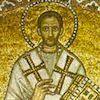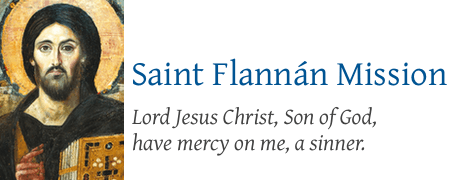 In the Name of the Father and of the Son and of the Holy Spirit, one God. Amen. Dear beloved, as we walk through the Week of the Publican and Pharisee, let us commemorate the Translation of the Holy Relics of Father among the saints, Saint John Chrysostom. This coming Sunday is also the Synaxis of the Three Holy Hierarchs Saint Basil the Great, Saint Gregory the theologian, and Saint John Chrysostom. Saint Basil, Saint Gregory, Saint John Chrysostom, pray for us!
In the Name of the Father and of the Son and of the Holy Spirit, one God. Amen. Dear beloved, as we walk through the Week of the Publican and Pharisee, let us commemorate the Translation of the Holy Relics of Father among the saints, Saint John Chrysostom. This coming Sunday is also the Synaxis of the Three Holy Hierarchs Saint Basil the Great, Saint Gregory the theologian, and Saint John Chrysostom. Saint Basil, Saint Gregory, Saint John Chrysostom, pray for us!
Saint John Chrysostom is a great ecumenical teacher and holy hierarch respected and loved by many in his time until today. He had an untimely death in 407 AD. His disciple, Patriarch of Constantinople Saint Proclus, during a Divine Liturgy at the Hagia Sophia, was praising Saint John Chrysostom, “O John, your life was filled with sorrow, but your death was glorious. Your grave is blessed and reward is great, by the grace and mercy of our Lord Jesus Christ O graced one, having conquered the bounds of time and place! Love has conquered space, unforgetting memory has annihilated the limits, and place does not hinder the miracles of the saint.”
When Saint Proclus said that, the people were so moved that they asked the saint to intercede with the emperor to allow the holy relics of Saint John be brought back to Constantinople. The emperor was touched by the sincerity of Saint Proclus the Patriarch and gave an order to transfer the relics of Saint John.
However, nobody could lift the holy relics of Saint John. The emperor then realized that he gave an order, rather than with a prayer. So the emperor wrote a petition to the reposed Saint John, asking for the saint’s forgiveness. When the emperor’s petition was read out, the people could lift the holy relics of Saint John, and the relics were transferred to Constantinople. When Saint Proclus opened the coffin, he saw the incorrupt body of Saint John. The emperor saw the incorrupt body of Saint John and cried to the reposed saint, asking for forgiveness for his mother who exiled the saint.
In the morning, when the people brought the saint’s coffin to the Church of the Holy Apostles, they cried to the saint, “Father, take up your throne!” Then Saint Proclus and the people saw Saint John’s incorrupt body open his mouth and declare, “Peace be to all”. Many sick people were healed.
“Let us flee from the pride of the Pharisee and learn humility from the Publican’s tears? Let us cry to our Lord and Savior Jesus Christ, have mercy on us!”
Let us remember that while God has infinite mercy on all of us who profess our faith in humility and repentance before Him, He cannot save us if we pretend or imagine ourselves as saints (St Luke 18:9-14).
As a Christian, prayer is central to our lives. As Saint Ephraim the Syrian said, “Blessed is he who prays with fervor, for the devil never approaches him”. If we pray unceasingly, the evil one has no room to sneak in. All of us who are deep in the world, will struggle in the world and grapple with our faith. And yet, do not despair even if we cannot pray unceasingly, for God is merciful and hears us when we repent and pray. Pray to God for strength against our obstacles along our pilgrimage to Him, for the path to God is a battlefield that we need to fight hard for. It is a race till the end of our journey.
Saint Tikhon of Zadonsk encouraged us thus. “Prayer does not consist merely in standing and bowing your body or in reading written prayers… it is possible to pray at all times, in all places, with the mind and spirit. You can lift up your mind and heart to God while walking, sitting, working, in a crowd and in solitude. His door is always open, unlike man’s. We can always say to Him in our hearts: Lord have mercy.”
The Christian prayer is dynamic and abundant in action. It is not a mere repetition of words. The Desert Fathers said, “What is pure prayer? Pure prayer is brief in words but abundant in actions. For if your actions do not exceed your petitions, then your prayers are mere words.” (St Matthew 6:5-15, St John 14-17).
When we think of prayer, we often think of 4 kinds of prayers – Lamentations, Requests, Gratitude, and Praises. But in the Church, especially when it comes to the journey towards Theosis, we are thinking of the fifth kind of prayer – Dialog. In the Church, a dialog with God can be silent, listening, lifting our minds and hearts to God, to be aware of His Holy Name and His everything. Let us, in our daily walk, be aware of the fifth kind of prayer even as we make other forms of prayer. After all, God is not the lottery, or a genie. In our journey as Christians, it is the relationship we hope to bond with God that makes the difference. There is power in prayer, especially prayer that is abundant in love and steeped in humility and repentance, interceding for the needs of others before us.
Let us call upon the Holy Name of Christ our Lord and Savior often, for there is power in His Holy Name, “Lord Jesus Christ, Son of God, have mercy on me, a sinner”.
Let us close by praying the thanksgiving prayer:
It is truly meet to call thee blest, the Theotokos, ever blessed and most pure, and the Mother of our God. More honorable than the Cherubim, and more glorious than the Seraphim, without corruption thou gavest birth to God the Word: True Theotokos, we magnify thee.
O virgin Theotokos, rejoice; O Mary full of grace, the Lord is with thee. Blessed art thou among women, and blessed is the fruit of thy womb, for thou hast borne the Savior of our souls, Jesus Christ our Lord. Amen.
Fr Raphael+
Readings
Leviticus 5:1-6
Psalm 51:1-19 (LXX 50)
St Mark 13:31-14:2
1 John 1:8-2:6

